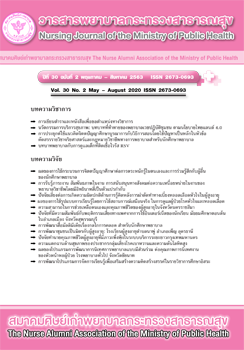Health Literacy of the Population at Risk for Diabetes and Hypertension
Main Article Content
Abstract
This descriptive cross-sectional research aimed to study the level of health literacy of the population who were at risk for diabetes and hypertension in Surat Thani province. The data were collected during October 2018-September 2019. A sample of 325 people who were at risk for diabetes and hypertension visiting the health promotion hospital, Muang Surat Thani was recruited using simple random sampling. The data collection tools consisted of a 1) general information questionnnaire and 2) Health literacy questionnaire composed of 8 components in 61 items. The item objective congruence of the questionnaire was validated by 3 experts yielding values of all items greater than 0.67 and the Cronbach’s Alpha coefficient was 0.86. The data were analyzed using frequency, percentage and mean. The results showed that the sample consisted of females (56%) and males (44%). The mean age was 51.23±11.34 years. Knowledge regarding health behavior of the sample was somewhat correct at 64.62 percent, followed by a misunderstanding (24% correct)and correct understanding at 11.38%. Access to health information and health services was at the lowest level (54.15%), communication skill was at a fair level (68%), self-management was at a fair level (76.31%). Media literacy was at a fair level (74.77%), decision skill was at a fair level (78.46%). Participation in social health activity was at a fair level (69.23%), and individual health care was at a fair level (72.62%). Based on the results of this study, health care providers should promote health literacy among people who are at risk of diabetes and hypertension, in order to have a better understanding of how to monitor their blood pressure and blood glucose level and to practice appropriate health care behaviors.
Keywords: health literacy; diabetes; hypertension
Article Details
บทความและรายงานวิจัยในวารสารพยาบาลกระทรวงสาธารณสุข เป็นความคิดเห็นของ ผู้เขียน มิใช่ของคณะผู้จัดทำ และมิใช่ความรับผิดชอบของสมาคมศิษย์เก่าพยาบาลกระทรวงสาธารณสุข ซึ่งสามารถนำไปอ้างอิงได้
References
2. Bureau of Non-Communicable Diseases, Department of Disease Control, Ministry of Public Health. Non-communicable diseases in the community (Diabetes and Hypertension). [Internet]. [cited 2018 January 10]. Available from http://www.thaincd.com/document/file/download/paper-manual/CNN-Book.pdf
3. Wongnisanatakul K. Health literacy among diabetic patients at the family practice center of Phra Nakhon Si Ayutthaya Hospital. Journal of Preventive Medicine Association of Thailand,2018;8(1):49-61. (in Thai).
4. Nutbeam D. Health literacy as a public health goal: a challenge for contemporary health education and communication strategies into the 21st century. Health Promotion International. 2000;15(3):259-267.
5. World Health Organization. Health literacy final. [internet]. [cited 2018 January 10]. Available from http://www.who.int/healthpromotion/conferences/7gchp/Track1_Inner.pdf
6. Woratanara T, Woratanarat P, Wong O, Janepanichsap M. Situation review and mechanism of dispersion
management Health. Research report: Office of Research and Development for the transformation of health research into practice. Department of Preventive and Social Medicine Faculty of Medicine Chulalongkorn University;2015. (in Thai).
7. Riangkam C, Wattanakitkrileart D, Ketcham A, Sriwijitkamol A. Health literacy, self- efficiency, age and visual acuity predicting on self-care behaviors in patients with type 2 diabetes. Journal of Nursing Science 2016;34(4):35-46. (in Thai).
8. Kaewtong N, Termsirikulcha L, Leelaphun P, Kengganpanich T, Kaeodumkoeng K. Health literacy of group at risk of hypertension at ban nonghoi sub-district health promoting hospital, Sa Kaeo Province. Journal of Boromarajonani College of Nursing, Bangkok 2014;30(1):45-56. (in Thai).
9. Health area 11, Office of the Inspector General Ministry of Public Health. (2015). Public health strategy Year 2016. [internet]. [cited 2018 January 10]. Available from http://www.rpho11.go.th/rpho11/upload/news/news-doc-00262.pdf
10. Health Education Division, Department of Health Service Support Ministry of Public Health and Srinakharinwirot University. ABCDE-Health literacy scale of Thai adults. Nonthaburi: Department of Health Service Support Ministry of Public Health;2014. (in Thai).
11. Thongthanasukan C, Neelaphaijit N. Development of health literacy tools for people with diabetes and hypertension. Nonthaburi: Health Education Division, Department of Health Service Support Ministry of Public Health;2015. (in Thai).
12. Arahang R. The effect of a health promotion program on high blood pressure prevention behaviors for high blood pressure risk groups at a community in Nakhon Pathom province. [Dissertation]. Christian University 2017. (in Thai).
13. Rattanawarang W, Chantha W. Health literacy of self-care behaviors for blood glucose control in patients with type 2 diabetes, Chainat Province. The Journal of Baromarajonani College. 2018,24(2):34-51. (in Thai).
14. Luenam A, et al. Predictive factors of self-care behavior for prevention of hypertension among population group at risk. HCU Journal Of health Science 2019;23(1):393-406. (in Thai).
15. Samruyruen K, Sribenchamas N. Effectiveness of medication using literacy program on medication use behaviors among hypertensive patients in Pho Sai Ngam health promoting hospital, Bueng Na Rang district, Phichit Provience. EAU Heritage Journal Science and Technology 2019;13(2):297-306. (in Thai).
16. Nutbeam D. The evolving concept of health literacy. Social Science & Medicine. 2008;67(12):72-8.
17. Wanpakae C, Phatasena T. Relationship between health literacy and personal factors with health behavior among risk group with hypertension in Talad sub district, Muang district, Nakhon Ratchasima Province. SVIT Journal. 2018;(Special issue):176-85. (in Thai).
18. Phongphetdit B. Participatory community-based in promoting self-care of patients with chronic diseases to prevent Stroke. Thai Journal of Cardio-Thoracic Nursing. 2018;29(2).2-11. (in Thai).
19. Samrueanruen K, Sri Benjamas N. Understanding on assessing health literacy. EAU Journal Science and Technology. 2018;12(3):1-13. (in Thai).

